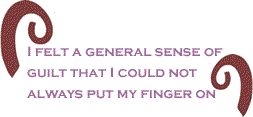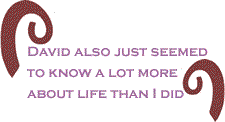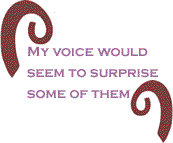|
I was
13 years old during the summer of 1973, and my friend Howie
and I were riding our bikes into downtown Olean, which was a good five mile journey for us.
 We
took Front
St. as we were getting into town, which follows a route
next to where the railroad tracks are elevated. There were
a few blocks of rundown homes in that part of town, occupied
mostly by black families. As my friend and I were riding,
I noticed a black boy around my age on his porch up ahead,
and as I began to peddle harder and faster I yelled “Nigger”!!
as I sped by his house. I recall that he replied to me,
“You're one too”, kind of matter-of-factly. We
took Front
St. as we were getting into town, which follows a route
next to where the railroad tracks are elevated. There were
a few blocks of rundown homes in that part of town, occupied
mostly by black families. As my friend and I were riding,
I noticed a black boy around my age on his porch up ahead,
and as I began to peddle harder and faster I yelled “Nigger”!!
as I sped by his house. I recall that he replied to me,
“You're one too”, kind of matter-of-factly.
When my friend caught
up with me he was very surprised that I had said what I
did, and he asked me why. I cannot remember what I said
to him, but I can certainly recall the reasoning behind
my words to the young boy sitting on his porch. That type
of behavior, I had thought, would distance me from being
associated with black people, even though I had been called
a nigger before, by white boys. Every time I saw my reflection
in the mirror, I saw a face looking back with brown skin.
The same face as the boy to whom I had just leveled a serious
racial slur.
When there were problems
at school having to do with my skin color, this would generally
result from my reaction to an insult from another child,
although I usually denied this connection. At some point,
the other children who attended my all-white classrooms
became curious. There would sometimes be conflicts with
classmates, usually boys. When I was called a name or there
would be a problem that they had because of my dark skin,
I would take this all back home to my mother.
Until I reached the
age of about fifteen, at the infrequent time I would come
across a black youth while in the company of my white buddies,
I would occasionally feel the need to do the same thing.
More than once, I took part in scenes similar to the one
where I verbally accosted the young boy sitting on his porch.
As a teenager, speaking disparagingly about black people,
while in the company of white boys, boosted my ego. If white
boys could call me names, and “I certainly wasn’t black”,
then I would, in turn, call black people names. It made
me feel better, and it also gave me a sense of control,
regardless of the logic.
 My
rationale was generally not challenged because I associated
exclusively with white people, to whom this posed no threat,
only curiosity and amusement. There was one black family
with a son and daughter both younger than I who began school
a few years after I did. Julius was closest to my age, maybe
two years younger, and his sister was several years younger
than that. I never said a word to him in school and even
remember a feeling of pity and embarrassment in his blackness.
He was a very dark skinned boy, which helped to fuel my
disgust for him, compounded with my own color sensitivity
/ dysfunction. My
rationale was generally not challenged because I associated
exclusively with white people, to whom this posed no threat,
only curiosity and amusement. There was one black family
with a son and daughter both younger than I who began school
a few years after I did. Julius was closest to my age, maybe
two years younger, and his sister was several years younger
than that. I never said a word to him in school and even
remember a feeling of pity and embarrassment in his blackness.
He was a very dark skinned boy, which helped to fuel my
disgust for him, compounded with my own color sensitivity
/ dysfunction.
I ran across Julius
a year or so after I had graduated, and I apologized to
him. I did not go into any detail, but I felt guilty for
the way I had ignored him and even for the way I had felt
about him. During that time period, my feelings could have
been compared to those of some white people who have just
attended a black awareness meeting for the first time. I
felt a general sense of guilt that I could not always put
my finger on, which of course made me very tense around
black people.
I was able to cultivate
my first friendship with a black man when I was twenty years
old, while I was in the Navy and attending school in Great
Lakes, Illinois.
David Jackson was around my age, from Cleveland’s
predominantly black east side and seemed very street-wise.
I was from the all-white town of Stow,
which was only about forty miles south, so we were practically
neighbors or so I thou ght.
David had been stationed
on the USS Ranger, an aircraft carrier home ported in Japan.
I appreciated knowing someone with what was to me, some
real Navy experience. David also just seemed to know a lot
more about life than I did.  What
would become increasingly apparent to me the longer I knew
him, was his awareness of American history, and how the
black man had been taken advantage of by the white man.
This was something my white education had never taught me. What
would become increasingly apparent to me the longer I knew
him, was his awareness of American history, and how the
black man had been taken advantage of by the white man.
This was something my white education had never taught me.
Looking back, I’m sure
that I was very annoying to David, if not infuriating at
times, and he tolerated me for a while, but eventually our
friendship soured. He called me an Oreo, which was a term
I had never heard.
I recall one time when
we had gone to the beach together along with a white friend
of mine whose last name was Freeman, and how he and I sat
in the sun on the sand, and David chose to sit underneath
a large fishing pier next to where we were. He never really
had anything nice to say about white people, which was curious
to me at first, and then started to get on my nerves. In
the mess hall, most of the black sailors sat together, and
because of my familiarity with white people, many times
I sat with them. This was something that I did without any
guilt.
Eventually, I became
aware of a current of animosity toward me from some of the
blacks sailors. Nothing was ever said to me directly, to
my recollection, I just began to notice some looks and behavior
that changed between some of the men with whom I had gotten
more familiar and me.
Another thing that came
to my awareness the more time I spent around my black shipmates
was that some were clearly taken aback by the way I spoke.
My voice would seem to surprise some of them somehow, or
catch them off guard in a way. I would get a smile sometimes,
while others would change the inflection of their voices,
but without fail, I would find people who would think that
I was arrogant or that I was trying to be “white”. Most
wouldn’t say anything though, and at the time I didn’t know
any better anyway. I attempted for a short time to imitate
“black lingo”, but found my effort to be just as ingenuous
and phony as when I observe white people doing the same
thing.

While living in Northern
California, after my experience in the Navy, I dated a black
woman for the first time. Karesia and I met when I was twenty-two,
she twenty-three, and we saw one another for a couple of
years. She had attended college for a while after high school
and had dropped out. She also had an up and down relationship
with her mother and step-father. I got to know her mother
and step father fairly well. Her father lived in Houston,
Texas, and her parents had divorced
when she was very young. Her mother grew up in Arkansas and was formerly a teacher, and her step- father was a retired
Army Lt. Colonel. She had black friends, but she also had
some white friends too, and she spoke like I did.
At some early point
of our courtship I told her the “skin disease” story, and
I will never forget her reply to me, “Your mamma really
put a whammy on you!” I remember that we used to talk about
white people derogatively on occasion, and listening to
her was yet more of an education for me. By that time, I
had experienced enough to really hear and understand what
she was saying, as opposed to a couple of years earlier
when I had known my friend David in the Navy.
This young woman was
able to provide me with some information that I had not
considered before as she heard more of my experience. She
told me that my mother probably still loved my father, which
was a thought that had never crossed my mind. The only information
I had heard about my father from my mother’s mouth was that
she had been raped. Karesia offered a different perspective.
She told me that my
mother had simply been a scared young girl when she got
pregnant by my father at twenty years of age.  She
didn’t know what else to do, and white society certainly
didn’t provide her with any real answers. I had never considered
anything close to this. I honestly thought that it sounded
a bit exaggerated or self-important. I had grown up hearing
very little about black people or black society, and what
I did hear or read was generally negative or condescending.
It took some time for me to accept this. At that point I
did not even know who my father was. She
didn’t know what else to do, and white society certainly
didn’t provide her with any real answers. I had never considered
anything close to this. I honestly thought that it sounded
a bit exaggerated or self-important. I had grown up hearing
very little about black people or black society, and what
I did hear or read was generally negative or condescending.
It took some time for me to accept this. At that point I
did not even know who my father was.
It would be a few more
years before I would listen to a message left on my answering
machine by my mother that would change my life. All the
episodes I have described here, and so many others like
them, were precipitated by a lie my mother told me as a
young child. The lie that she told me was that my brown
skin color was the result of a disease called melanism.
The reason, the circumstances,
and the motivation behind the lie my mother told me have
all been discussed in a story that broke in the national
news in September of 2005. I have made appearances on The
Dr. Phil Show, and have been interviewed by Tavis Smiley
and NPR’s Ed Gordon, among others, over the details of that
story. The story that I want to tell today is that the belief
I formed about the lie my mother told me about my skin color
indoctrinated me into a confusion about my racial identity
that would perplex me as a boy, pervade my young adulthood,
and persist for half a century.  My
confusion about race is one that would shape and mold my
relationships with blacks and whites alike. My
confusion about race is one that would shape and mold my
relationships with blacks and whites alike.
In more recent years,
the lie that led to confusion about my own racial identity
has prompted me to reflect about race, and relations between
whites and blacks. I have come to be grateful for the unique
perspective my early confusion about my own racial identity
has given me on race relations in general.
BlackCommentator.com
Guest Commentator, Dave Myers lives in Seattle, WA. Click here
to contact him.

|

